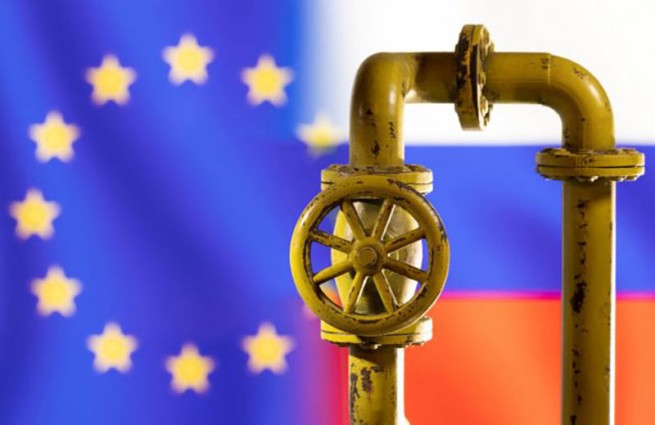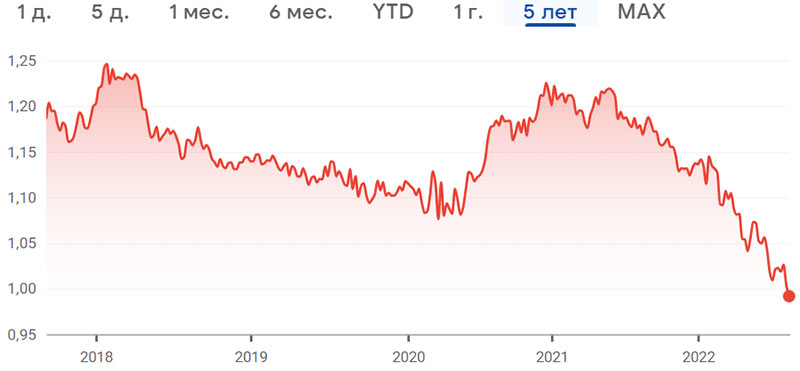The energy crisis has dropped the euro against the dollar to its lowest level in recent years. High inflation, fueled by rising gas, electricity and oil prices due to the ongoing war in Ukraine, is forcing America’s central banks, led by the US Federal Reserve (Fed), to embark on a massive increase in interest rates, which significantly strengthens the dollar.
At the same time, fears are growing that the energy price crisis could hit the eurozone and the entire economy hard. EU in the near future, especially after the shutdown of the Nord Stream 1 gas pipeline, which is expected at the end of the month.
But what is the fate of the single European currency, at least for the near term, and what does this mean for the European Central Bank, imports and exports of goods? Greek edition OT presents answers to some key questions about the biggest euro retreat since the early 2020s.
Could the euro fall even more?
The European single currency fell to $0.97 before settling at $0.99, and there are fears that it could fall even lower due to the current situation combined with runaway inflation. The euro has now returned to the levels it was at in 2002, just a few months after its creation. Morgan Stanley is now forecasting that the euro will fall to $0.97 this quarter, something that hasn’t happened since the early 2000s. Nomura International, in turn, predicts a retreat to $0.975 by the end of September. After that, the exchange rate could rush to $0.95 or possibly lower as pressure on energy supplies increases the risk of blackouts and is likely to increase imports through euro payments, according to research conducted by Bloomberg.
Is the exchange rate of only the euro or other currencies declining?
The US dollar has strengthened against most of the world’s currencies, causing investors to back away from risky investments amid growing fears that higher interest rates in the US and Europe to curb inflation will weaken the global economy, international analysts say. The dollar is now up to more than a five-week high against a basket of other strong currencies and is near a two-decade high for the index, which it hit again in mid-July, data from Reuters show. Markets evaluate dollar performance based on a “basket” that includes the euro, Japanese yen, British pound, Canadian dollar, Swiss franc and Swedish krona.
What is the Fed’s role in these events?
A key driver of the depreciation of the single currency is that the US Federal Reserve is raising lending rates much faster than the European Central Bank, which is attracting more funds in the dollar. Indeed, the greenback found new support as several Federal Reserve officials reaffirmed a more aggressive stance on monetary tightening, even ahead of the Fed’s conference in Jackson Hole, Wyoming, USA this week.
 |
Read also: Who wins the war |
How difficult is the task of the ECB?
The ECB is now at a crossroads, as allowing the currency to fall too low would increase the risk that price gains would take hold well above the ECB’s 2% target. However, a faster rise in interest rates will be needed to combat the fall of the euro, which could hurt an economy already facing a potential recession. Studies frequently cited by the ECB show that a 1% depreciation in the exchange rate increases inflation by 0.1% in one year and up to 0.25% in three years.
What is the role of Russia in all this?
A new depreciation of the euro was recorded after last Friday Russia announced a three-day cessation of gas supplies to Europe via the Nord Stream 1 gas pipeline at the end of this month. Investors are concerned that this flow disruption could exacerbate the energy crisis that has plagued the single currency in recent months.
How does a change in exchange rates affect the economy?
A cheap euro is a strong incentive for eurozone exports to third countries outside the single currency, as it makes goods from Germany or France sent to countries like the US more competitive, for example. It also favors the development of tourism in the countries of Southern Europe, including Greece.
But at the same time, this creates other problems, a vicious circle that further increases the price of energy, and especially oil, priced in US currency. It also makes it more expensive for Eurozone residents to travel to other continents.







More Stories
EU employment record: Greece "stuck" in a low position
“Bonus” of 300 euros for the long-term unemployed
Turkish tourists choose Samos for their holidays